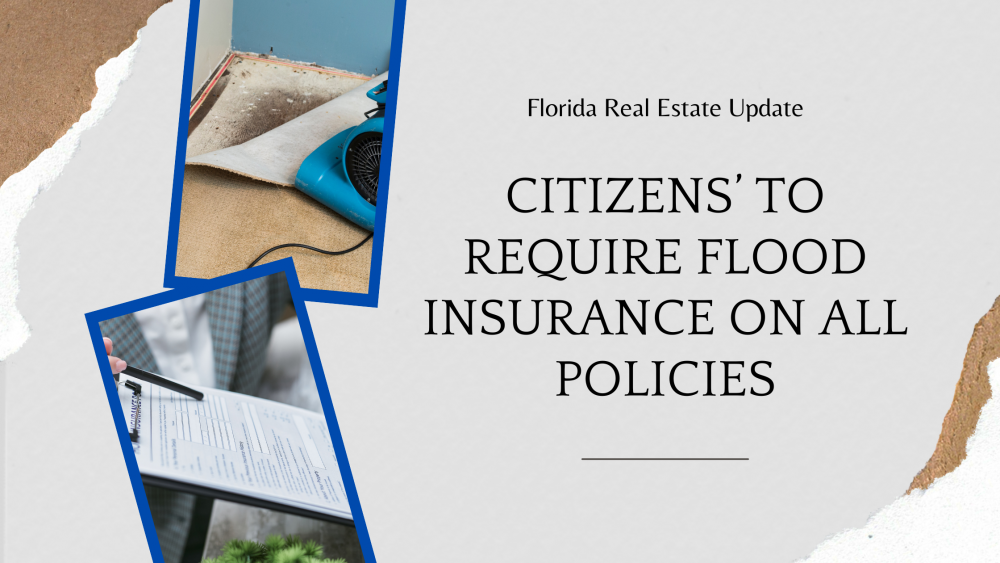
As weather patterns change here in Florida and flood losses become more costly and catastrophic to the uncovered, insurance providers are adjusting their policies to enhance protection for homeowners. In a significant move, Florida's state-backed insurer, Citizens Property Insurance Corporation (Citizens), has announced that it will require nearly all of its residential policyholders to carry flood insurance by January 1st, 2027. This new mandate is part of an effort to mitigate risk in the most hurricane-prone state in the U.S.
In this blog post, we will explore what this means for current and future property owners in Florida. We’ll break down the key aspects of these changes so you can be prepared when they take effect.
Mandatory Flood Insurance Requirement by 2027
By January 1st, 2027, almost all residential policies underwritten by Citizens will be required to include flood insurance coverage, regardless of whether your home is located within a designated flood zone or not. This sweeping requirement underscores how seriously both insurers and regulators are taking the increasing risks posed by flooding across the state of Florida.
Exceptions
However, there are some exceptions worth noting: condominium unit-owner policies, tenant content policies, and other policies that exclude windstorm or hail coverage will not be subject to this mandatory flood insurance requirement. These exclusions recognize that certain types of properties may have different levels or types of exposure.
For those who do fall under this new rule but currently lack flood insurance because they live outside traditional high-risk areas like special flood hazard zones (SFHAs), now is the time to start planning ahead. The cost implications could vary depending on several factors including location and dwelling value; however, securing adequate protection against potential water damage should outweigh any initial financial concerns.
Special Flood Hazard Areas: Check Your Status
For those living within newly mapped special flood hazard areas (SFHA), the requirement for obtaining flood insurance kicks in upon renewal of their existing policies. FEMA regularly updates its maps identifying these high-risk zones; therefore, it’s crucial for homeowners to stay informed about their property's status.
You can check if your home falls into one of these newly identified SFHAs by visiting Fema.gov. Being proactive about understanding your risk level can help you prepare financially and ensure compliance when it's time for policy renewal under the new guidelines set forth by Citizens' Policies requiring Flood Insurance.
New Rules and Required Documentation
With these new rules come additional documentation requirements designed to ensure compliance with Citizens' policies. One critical document that homeowners must provide is proof of flood coverage meeting specific criteria outlined by Citizens. To facilitate this process, form CIT FW01 must be completed and submitted as evidence.
The introduction of CIT FW01 aims to standardize how proof of flood insurance is presented and verified. This form will require detailed information about your property's location, elevation data if available, and specifics regarding your current or newly acquired flood insurance policy. By mandating such comprehensive documentation, Citizens will attempt to ensure that every homeowner meets its stringent standards for adequate protection against flooding events.
Homeowners should start preparing now by gathering necessary documents related to their existing policies or initiating conversations with insurers about obtaining appropriate coverage before the deadline approaches in 2027. Early preparation can help avoid last-minute scrambles and ensure seamless compliance with these upcoming regulations.
Wrapping Up
The upcoming requirement for flood insurance coverage by Citizens Property Insurance Corporation marks a significant shift in Florida's approach to safeguarding homeowners against increasing flood risks. As the deadline of January 1st, 2027, approaches, it’s essential for property owners to understand their obligations and take proactive steps to secure the necessary coverage. If you have any further questions or need assistance navigating these changes, we encourage you to reach out to your trusted insurance provider. They can offer personalized guidance and help ensure you are well-prepared for the future.


